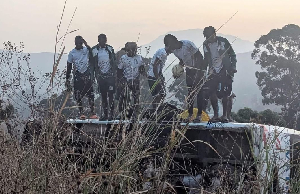Yaounde — The World Bank and the Cameroonian government signed today the financial agreement on the Safety Net project. The signing ceremony during which both the Minister of the Economy, Planning and Regional Development, M. Emmanuel Nganou Djoumessi and the World Bank Director of Operations, M. Gregor Binkert welcomed this new project, took place at the ministry of the Economy, Planning and Regional Development. The World Bank's Board of Executive Directors approved on March 21, 2013, a credit of US$50 million to assist Cameroon build a national safety net system that will directly benefit 420,000 vulnerable people during the life of the project. Through cash transfers and public works, the safety net system will help reduce poverty and ensure people benefit more equitably from economic growth.
The Social Safety Nets Project, financed by the World Bank's International Development Association (IDA)*, will fund programs that initially reach 65,000 poor and vulnerable households in the five poorest regions of Cameroon--Adamaoua, the East, the North, the North-West, and the Far-North. The project will also cover about 5,000 urban households in Yaoundé and Douala.
Over a two year period, targeted households will receive a cash transfer every two months, totaling FCFA 720,000 (about US$ 1,400), as well as training to improve their health, nutrition, education and skills. Poor households will also have the opportunity to participate in public works employment for 60 days a year during the agricultural lean season. Paid activities will include public goods such as maintaining rural roads or reforestation.
"Cameroon's new safety net will help cut poverty faster by cushioning some of the poorest families from unexpected hardships and enable them to continue investing in their children," said Gregor Binkert, World Bank Country Director for Cameroon. "Safety nets are helping poor households become more resilient and productive across Africa, including in Rwanda, Ethiopia, Niger, and many other countries."
In line with Cameroon's first national social protection strategy, the project will help design sustainable safety nets that reach those most in need. With this system in place, the Government will be able to ramp up support to poor families quickly and flexibly in times of crisis.
"This project will help poor families living in rural areas in Cameroon to cope with drought and its worst effects, including losing income, selling livestock or other assets, and suffering severe food insecurity and malnutrition," said Carlo Del Ninno, World Bank Task Team Leader for the Social Safety Net Project.
The World Bank's support to social protection in Sub-Saharan Africa has grown from an average of US$260 million a year during 2001-05 to US$600 million a year during 2006-2010. Total active World Bank commitments in social protection on the continent stand at just over US$ 3 billion.
* The World Bank's International Development Association (IDA), established in 1960, helps the world's poorest countries by providing loans (called "credits") and grants for projects and programs that boost economic growth, reduce poverty, and improve poor people's lives. IDA is one of the largest sources of assistance for the world's 81 poorest countries, 39 of which are in Africa. Resources from IDA bring positive change for 2.5 billion people living on less than $2 a day. Since 1960, IDA has supported development work in 108 countries. Annual commitments have increased steadily and averaged about $15 billion over the last three years, with about 50 percent of commitments going to Africa.
Actualités of Wednesday, 2 April 2014
Source: World Bank












